Downed Ukrainian Plane Parents Reject ‘Hush Money’
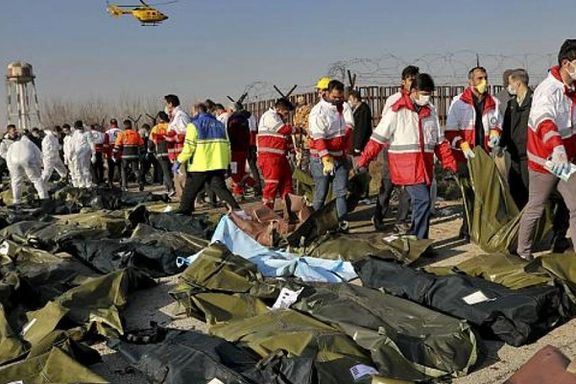
Some parents of those killed in Iran’s downing of Ukrainian Airlines Flight PS752 in January 2020 have rejected compensation offered them.

Some parents of those killed in Iran’s downing of Ukrainian Airlines Flight PS752 in January 2020 have rejected compensation offered them.
In a letter to Rostam Ghasemi, the minister of roads and urban development, published Monday, 39 parents said they instead wanted “justice.” They urged the authorities to end their “lies and cruel behavior” and “psychological pressure on the bereaved families” following the shooting down of the airliner.
The letter said any compensation – a figure of $150,000 was cited last month – was worthless, and called for “the main perpetrators including the masterminds, planners and approvers” to be “handed over” and brought “to justice.” Signatories demanded the release to bereaved families closed-circuit video footagefrom the Imam Khomeini International Airport on the day the flight took off.
Dismissing Iran’s claim that the disaster resulted from the malalignment of a mobile missile defense battery, at a time when a United States strike was feared, the parents wrote that “paying compensation before the facts are clarified, a fair trial is held, and the perpetrators of this crime are punished is nothing but hush money.”
All 176 passengers and crew on the plane died in the disaster. Some relatives of victims have described the firing of the missies as a “premeditated act.” A report from the Canadian government, which had many nationals on the place, found in 2021 that the action was “reckless” but not premeditated.
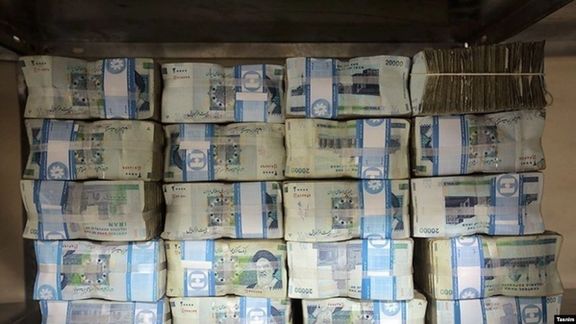
Liquidity in Iran has increased by $14 billion in the past six months, figures released by the central bank show, keeping annual inflation above 40 percent.
Total liquidity reached 44,270 trillion rials or $177 billion based on the current free-market exchange rate, as the government borrowed and printed money to pay for its needs.
The dangerous growth in liquidity occurred during the first six months of President Ebrahim Raisi’s term, despite his government’s repeated promises to curtail liquidity growth, which has led to four years of high, double-digit inflation.
The negative economic news published on Sunday comes as the government has been claiming a substantial increase in oil and non-oil exports revenues.
Ali Salehabadi, chairman of the Central Bank of Iran (CBI) told local television on Sunday that from March 2021 the government has been able to provide $48.6 billion in foreign currency for imports amid US sanctions on the country’s oil exports and international banking. This amount from March 2020 to March 2021 was $37 billion, Salehabadi said. The boost in allocation of US dollars for imports was more than 30 percent if the figures by the central bank chief are correct.
It is not easy to reconcile the two claims. If Iran earned 30 percent more foreign currency since March, and also printed more money, it means a decision was made to continue the inflationary practice of enlarging liquidity, instead of using the additional foreign currency to fight rising prices.
The annual inflation rate has been hovering above 40 percent for at least a year, with food prices rising at 60 percent annually, creating serious political risks for the Islamic Republic.
The government’s debt to the central bank increased by 3 percent and reached $8 billion, in addition to debts to government-owned and quasi-state banks.
The Raisi government faces a 50-percent budget deficit in the new Iranian year starting March 21 and as parliament grapples with the proposed budget bill it is not clear how the deficit will be addressed. In past years, the government has avoided clear explanations, indicating that printing money was the main source of income.
This is partially to blame for the steep fall in the value of the national currency that has declined almost eightfold since late 2017, from 33,000 rials to the US dollar to 267,000 on Monday.
Iran’s hopes can only rest on a nuclear agreement with the United States, which would lift sanctions on its oil exports and international banking. But local economists have warned that additional exports will be a partial and temporary cure for an economy that has had no growth in the past decade. Iran would need ten years of annual 8-percent economic growth to return to where it was in 2010 when the United Nations started imposing nuclear sanctions, which were lifted in 2015 after a nuclear agreement was signed.
Former US president Donald Trump withdrew from that accord in 2018 and reimposed American sanctions.
Although Iran has increased its sanction-busting oil exports in the past one year, primarily to China, it is not clear how much cash revenue it gets. Chinese are willing to buy heavily discounted oil but it is not clear if they are willing to pay in cash through banks in violation of US banking sanctions.
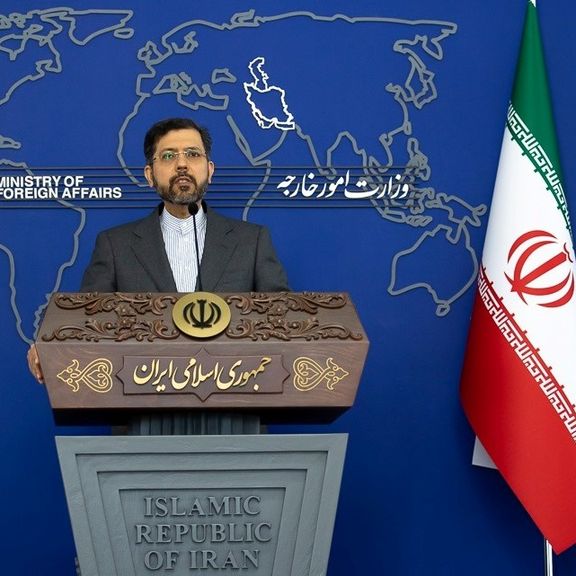
Iran has criticized the United Kingdom over the ‘Iran Atrocities Tribunal,’ which held a second round of sessions in London last week.
At his press conference Monday, Iranian Foreign Ministry spokesman Saeed Khatibzadeh said Tehran had expressed “serious protests” to the UK over London acting as a “hub” for foreign media hostile to Iran.
The spokesman said the tribunal, which is meeting with selected media, was a “theatrical show.”
The tribunal − also known as Aban Tribunal after the Iranian calendar month of Aban of 2019 protests over fuel increases −sat from Friday to Sunday. It has ‘indicted’ 160 Iranian officials with “crimes against humanity.”
But while the tribunals’ ‘verdicts’ are symbolic, some organizers have said a file has been sent to the International Criminal Court and have called for international sanctions against named individuals.
When in London to meet British officials in November, deputy Iranian foreign minister Ali Bagheri-Kani said the tribunal’s activities in London could jeopardize progress in Vienna, where he leads Iranian negotiators meeting world powers, including the UK, trying to revive the 2015 international agreement limiting Tehran’s nuclear program.
During the November 2019 protests, following a fuel price increase designed to ease a fiscal deficit, Amnesty International documented the killing by security forces of over 300 people.

The ‘honor-killing’ of a 17-year-old woman, and mother of 3-year-old, in southern Iran on Saturday has sparked debate among Iranians over laws regarding women.
Iranian authorities shut down a news agency on Sunday after it published a video of the husband parading in the street with his wife’s severed head.
Rokna agency had reported that the man with the help of his brother had killed the woman in what it termed an ‘honor killing.’
Abbas Hosseini-Pouya, prosecutor general of Ahvaz, provincial capital of Khuzestan, told the press that two alleged killers had been arrested. Rokna had reported that Mona Heydari had been killed in Ahvaz by her brother-in-law and husband, allegedly after her father helped the husband bring her back from Turkey where she had fled, purportedly from her husband's violence.
Honor-killings are rampant in some regions of the country, such as Khuzestan and Kermanshah where tribal structures are still very strong.
Heydari had been married to a paternal cousin at the age of 12 and had a child at 14. Hosseini-Pouya said that she had sent photos of herself to her husband from Turkey that had fueled the husband's “negative emotions."
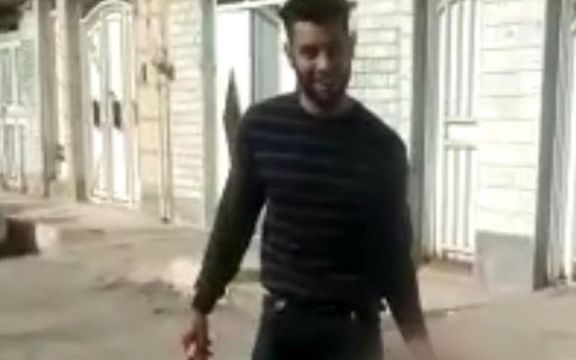
The prosecutor general said the legal authorities would act both over the killing and the display of the severed head, and that action would also be taken against anyone who had filmed the incident, possibly to post on social media.
Hashtags such as the victim's name, child marriage, ‘honor-killing,’ Ahvaz, and woman were among the top ten Persian-language Twitter hashtags Monday. Telegram and Instagram were dominated by discussions of the incident.
"He has ruled, before a trial, that the victim whose head was paraded in the street was to blame for her own killing because she hurt her husband's emotions," one tweet read, finding fault with the prosecutor and linking the killing to the constitutional watchdog Guardian Council refusing to endorse legislation banning child marriage.
Hardline media, except the IRGC-linked Javan newspaper, ignored the incident. in an article entitled "Psychological Damage [to Society] With Violent Images Not Media's Job", Javan defended the shutting down of Rokna.
"This is not the first time that to attract more readers privately-owned media publish news, photos and videos considered as immoral by the society and directly threaten the emotional health of the society," Javan wrote, without mentioning honor killing or laws that critics say encourage such crimes.
The reformist journalist Abbas Abdi preferred to take issue with conservative papers that didn’t report the killing. "Hardliners who must condemn the killing of the Ahvazi girl are silent about it because they traditionally believe such behavior can prevent sexually related transgressions, so their silence means relative condonement of this horrible incident," Abdi wrote in Etemad newspaper, which ran several articles on the issue.
Etemad did condemn Rokna for publishing the images. Like many media, it used the term “honor killing” in a headline, while attacking he conservative-dominated parliament for introducing laws encouraging women to have more children rather than, the paper said, introducing more laws to protect them from violence.
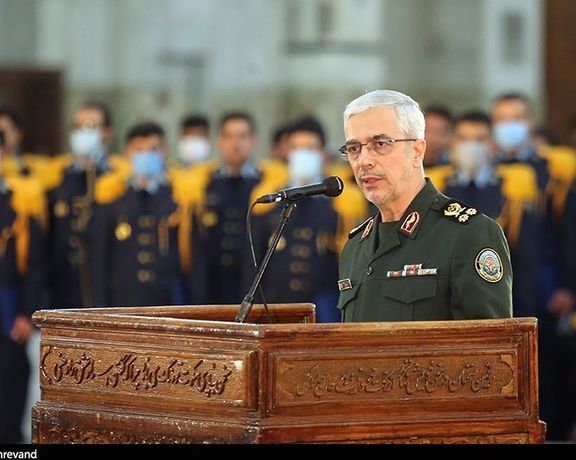
The top military commander of the Islamic Republic says Iran will become one of the world's biggest arms exporters once sanctions are lifted.
Chief of General Staff of the Iranian Armed Forces Major General Mohammad Bagheri made the remarks during a ceremony at the mausoleum of Ruhollah Khomeini, the founder of the Islamic Republic, on Monday.
Bagheri boasted about the power of Islamic Republic’s precision-guided missiles and drones with multiple applications.
“We don’t need anybody. We determine our strategy, policy and doctrine”, he said, adding that except for “three main superpowers in the world” no country can do this, “not even the Europeans”.
During recent days, while the government has been celebrating the revolution's anniversary, many officials have made such remarks about Iran’s military power.
IRGC Commander Hossein Salami said on Friday that “no world power is capable of confronting the Iranian nation” and the editor of a hardliner daily operating under the aegis of the supreme leader says Iran's precision missiles can target any spot in Europe.
Members of the US House of Representatives asked President Joe Biden last week to focus on Iran’s ballistic-missile capabilities, expressing concerns about attempts to develop an intercontinental ballistic missile which could “potentially put US allies in Europe as well as the US homeland in range.”
Lawmakers demanded written answers in 30 days to questions about the capability of CENTCOM defense systems against the missile threat and the administration’s measures to enforce sanctions on sectors of Iran’s economy that support the ballistic missile program.
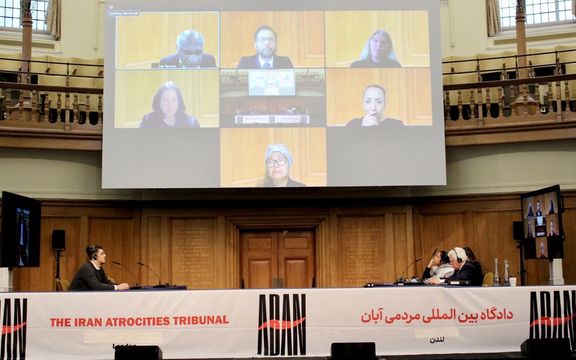
The Iran Atrocities Tribunal investigating gross rights violations has charged 160 officials of the Islamic Republic with "committing crimes against humanity".
The tribunal was established in 2020 to investigate the killing of hundreds of protesters in nationwide protests in Iran in November 2019. Concluding its second round of hearings in London on Sunday released a list of the accused officials, which includes Supreme Leader Ali Khamenei.
Heads of the executive and judiciary branches of the government, ministers, commanders from the Revolutionary Guards and police as well as officials from provincial governors’ offices are named in the list.
The tribunal heard testimonies from 219 witnesses and examined evidence from 440 people related to crimes against humanity, extrajudicial killings and executions, torture, rape of prisoners, and harassment of the families of the victims.
Although the verdicts of the Tribunal are symbolic, the panel of the tribunal called on all those who have more documents and evidence about crimes by officials to submit them.
Earlier in the day, a senior IRGC member, identified as witness 600, said that Khamenei's office ordered the military and paramilitary forces to do whatever is necessary to end the chaos.
Reuters had reported in December 2019 that the order to end protests at any cost had come from Khamenei who was deeply concerned about preserving the clerical regime.
The IRGC officer claimed that 427 people were killed in Khuzestan province and 420 in Tehran alone during the crackdown, adding that about 8,000 people were also arrested in the capital.
Earlier estimates ranged from 300 to 1,500 civilians killed nationwide. The new figure offered by the witness would mean that the overall death toll was much higher.
Organizers of the tribunal say an extensive systematic state policy was behind suppressing protesters with help from Iran’s proxy militia forces from the regional countries.
One of the witnesses said on Saturday that as a member of Iran’s ‘Imam Ali’ anti-riot brigades he had seen the deployment of “violent criminals” as well as members of the Iraqi Popular Mobilization Forces, and the Afghan Fatimiyoun militia, organized and commanded by the Revolutionary Guard (IRGC).
He added that Imam Ali brigades had set gas stations ablaze to blame the fires on the protesters and to justify suppression and had been authorized to shoot protesters in the torso and head to end the unrest.
The tribunal − also known as Aban Tribunal after the Iranian calendar month of Aban when the atrocities took place− was established by the Oslo-based Iran Human Rights (IHR), and the international anti-capital punishment organization Ensemble Contre la Peine de Mort (Together Against the Death Penalty).
The protests were the bloodiest in Iran’s history with security forces opening fire with military weapons on demonstrators in many cities. Thousands were arrested and jailed without due process of law and there were numerous reports of torture in prison.